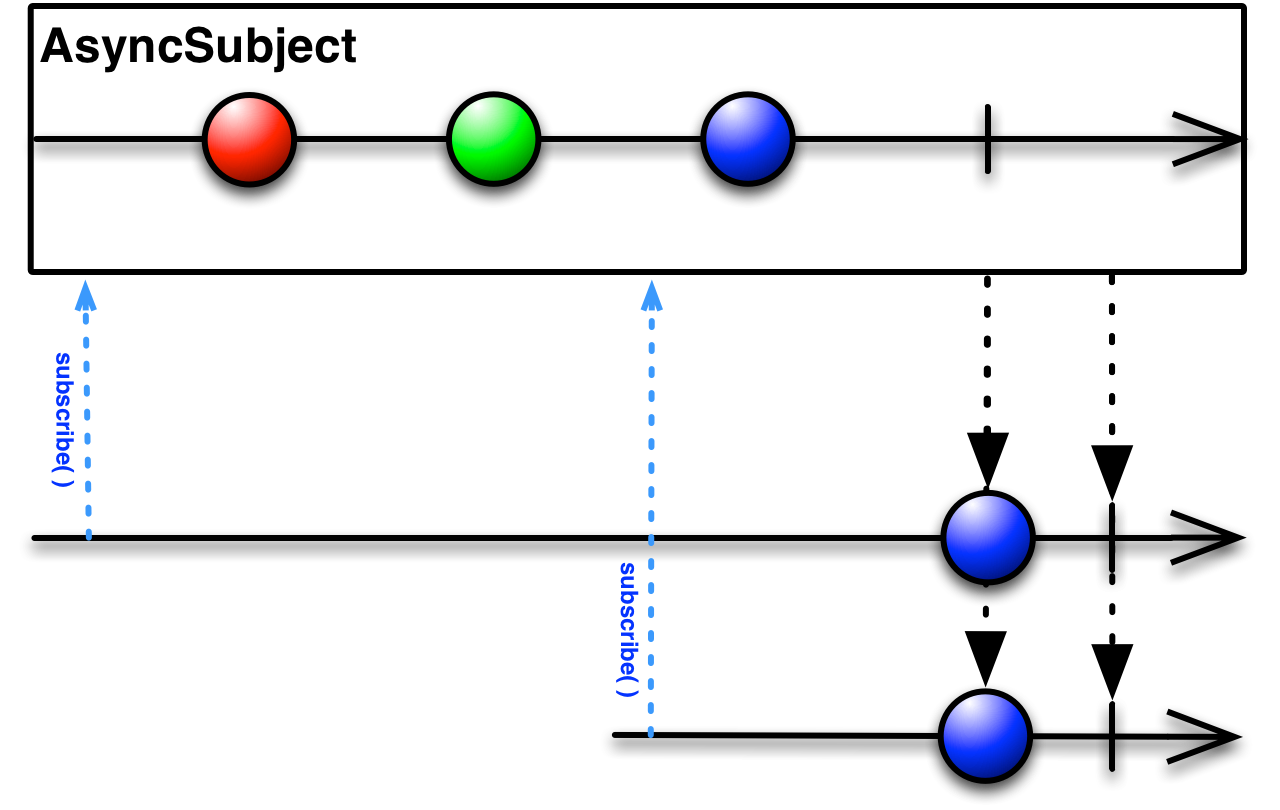rx.subjects.AsyncSubject Maven / Gradle / Ivy
/**
* Copyright 2014 Netflix, Inc.
*
* Licensed under the Apache License, Version 2.0 (the "License");
* you may not use this file except in compliance with the License.
* You may obtain a copy of the License at
*
* http://www.apache.org/licenses/LICENSE-2.0
*
* Unless required by applicable law or agreed to in writing, software
* distributed under the License is distributed on an "AS IS" BASIS,
* WITHOUT WARRANTIES OR CONDITIONS OF ANY KIND, either express or implied.
* See the License for the specific language governing permissions and
* limitations under the License.
*/
package rx.subjects;
import java.util.*;
import rx.Observer;
import rx.exceptions.Exceptions;
import rx.functions.Action1;
import rx.internal.operators.NotificationLite;
import rx.internal.producers.SingleProducer;
import rx.subjects.SubjectSubscriptionManager.SubjectObserver;
/**
* Subject that publishes only the last item observed to each {@link Observer} once the source {@code Observable}
* has completed. The item is cached and published to any {@code Observer}s which subscribe after the source
* has completed. If the source emitted no items, {@code AsyncSubject} completes without emitting anything.
* If the source terminated in an error, current and future subscribers will receive only the error.
*
*  *
*
* Example usage:
*
*
{@code
// observer will receive no onNext events because the subject.onCompleted() isn't called.
AsyncSubject
*
* @param
* the type of item expected to be observed by the Subject
*/
public final class AsyncSubject extends Subject {
final SubjectSubscriptionManager state;
volatile Object lastValue;
/**
* Creates and returns a new {@code AsyncSubject}.
* @param the result value type
* @return the new {@code AsyncSubject}
*/
public static AsyncSubject create() {
final SubjectSubscriptionManager state = new SubjectSubscriptionManager();
state.onTerminated = new Action1>() {
@Override
public void call(SubjectObserver o) {
Object v = state.getLatest();
if (v == null || NotificationLite.isCompleted(v)) {
o.onCompleted();
} else
if (NotificationLite.isError(v)) {
o.onError(NotificationLite.getError(v));
} else {
o.actual.setProducer(new SingleProducer(o.actual, NotificationLite.getValue(v)));
}
}
};
return new AsyncSubject(state, state);
}
protected AsyncSubject(OnSubscribe onSubscribe, SubjectSubscriptionManager state) {
super(onSubscribe);
this.state = state;
}
@Override
public void onCompleted() {
if (state.active) {
Object last = lastValue;
if (last == null) {
last = NotificationLite.completed();
}
for (SubjectObserver bo : state.terminate(last)) {
if (last == NotificationLite.completed()) {
bo.onCompleted();
} else {
bo.actual.setProducer(new SingleProducer(bo.actual, NotificationLite.getValue(last)));
}
}
}
}
@Override
public void onError(final Throwable e) {
if (state.active) {
Object n = NotificationLite.error(e);
List errors = null;
for (SubjectObserver bo : state.terminate(n)) {
try {
bo.onError(e);
} catch (Throwable e2) {
if (errors == null) {
errors = new ArrayList();
}
errors.add(e2);
}
}
Exceptions.throwIfAny(errors);
}
}
@Override
public void onNext(T v) {
lastValue = NotificationLite.next(v);
}
@Override
public boolean hasObservers() {
return state.observers().length > 0;
}
/**
* Check if the Subject has a value.
* Use the {@link #getValue()} method to retrieve such a value.
*
Note that unless {@link #hasCompleted()} or {@link #hasThrowable()} returns true, the value
* retrieved by {@code getValue()} may get outdated.
* @return true if and only if the subject has some value but not an error
* @since 1.2
*/
public boolean hasValue() {
Object v = lastValue;
Object o = state.getLatest();
return !NotificationLite.isError(o) && NotificationLite.isNext(v);
}
/**
* Check if the Subject has terminated with an exception.
* @return true if the subject has received a throwable through {@code onError}.
* @since 1.2
*/
public boolean hasThrowable() {
Object o = state.getLatest();
return NotificationLite.isError(o);
}
/**
* Check if the Subject has terminated normally.
* @return true if the subject completed normally via {@code onCompleted()}
* @since 1.2
*/
public boolean hasCompleted() {
Object o = state.getLatest();
return o != null && !NotificationLite.isError(o);
}
/**
* Returns the current value of the Subject if there is such a value and
* the subject hasn't terminated with an exception.
*
The method can return {@code null} for various reasons. Use {@link #hasValue()}, {@link #hasThrowable()}
* and {@link #hasCompleted()} to determine if such {@code null} is a valid value, there was an
* exception or the Subject terminated without receiving any value.
* @return the current value or {@code null} if the Subject doesn't have a value,
* has terminated with an exception or has an actual {@code null} as a value.
* @since 1.2
*/
public T getValue() {
Object v = lastValue;
Object o = state.getLatest();
if (!NotificationLite.isError(o) && NotificationLite.isNext(v)) {
return NotificationLite.getValue(v);
}
return null;
}
/**
* Returns the Throwable that terminated the Subject.
* @return the Throwable that terminated the Subject or {@code null} if the
* subject hasn't terminated yet or it terminated normally.
* @since 1.2
*/
public Throwable getThrowable() {
Object o = state.getLatest();
if (NotificationLite.isError(o)) {
return NotificationLite.getError(o);
}
return null;
}
}
